Ivan's Childhood
Introduction
Tarkovsky's first feature film for the Soviet-run Mosfilm production company (which had already been active for almost 40 years, and produced the great Eisentein epic, Battleship Potempkin) nearly didn't get made at all, and when it was, very nearly didn't get shown.
The story, originally a book by Vladimir Bogomalov, was first taken up by the screenwriter, Mikhail Papava. Papava changed the story dramatically, much to the annoyance of Bogomalov, and it was changed back again eventually. The young director Eduard Abalov was given the job of creating the film, but after a few months, the Soviet arts council stopped proceedings and piled on some grating criticism for good measure.
The film was then washed clean (literally) and it wasn't until Vadim Yusov, the cinematographer on this DVD and someone who had previously worked with Tarkovsky, approached the student director that another attempt was made. Half the money for the project had already gone unfortunately, and so the team had to do everything on far fewer Roubles than were hoped for.
Once made, it had a limited distribution until Kruschev (who had already denounced Stalinist policies after the dictator's death almost 10 years previously) himself watched it and refused to believe that children were used during the war in the manner depicted in the film. It was suddenly due to have an even more limited distribution. The raft of international prizes which Ivan's Childhood eventually won may well have swung his opinion a little.
The story is as follows…
Ivan Bondarev is 12 years old, and an orphan. His mother and sister were killed by the Nazis (although how and when isn't made clear), and he now works for the Red Army and associated partisans as a scout, passing messages between different Companies in the army, and being sent on reconnaisance missions that would be deemed too dangerous for anyone larger.
He is an escapee of a notorious Nazi death camp in Belarus, and is prone to day-dream of a happier life before the war, when he, his mother and sister would play on the beach, ride apple carts in the rain, and generally not have too many cares.
Real-life, however, isn't like that any more, and Ivan, in between missions and very long periods when he and the soldiers sit around waiting for 'the offensive', plans to avenge his family and those slaughtered in the concentration camp.
The soldiers, many of whom are not much older than Ivan, have almost adopted him as their 'son' and try to convince him that war is not for children, forming a plan to send him to the rear and join a military school. Ivan rebels and threatens to run away from wherever he is to join the partisans.
The men in the Company realise they're on a hiding to nothing, and apart from that, are involved in their own little dramas, from falling for a nurse who has been billeted with them, to trying to recover the bodies of two comrades killed by the Germans and left hanging as a warning to all. At least two, including the senior commanding officer, plan to adopt him for real after the war is over anyway.
When the attempt to rescue the bodies goes ahead, Ivan is sent off on one final reconnaisance and they part ways.
At the end of the war, the Russians have taken the Reichstag in Berlin, and one of Ivan's soldier friends is rifling through paperwork hastily dumped by the Germans. Ivan's fate stares him in the face…
Audio
Originally recorded in mono, the soundtrack is not bad at all, and has probably been cleaned up extensively. The new 5.1 surround however is excellent, and despite some 'forced' spacial effects (mostly involving dripping water and vehicle noises) sounds very natural, with the dialogue nice and clear, and the musical soundtrack following suit.
Video
Amazingly clear for the age of the film. There is little, if no evidence of scratches or dirt, and the phenomenal shades of light and dark (which are less obvious in Tarkovsky's later, colour films) are great to see.
Extras
The DVD states that there is a 'Memory'' featurette somewhere on the disc, but I'm afraid I couldn't find it. A documentary with the same name apparently appears on the 'Mirror' DVD however (which I hope to get to at some point), and so we'll see when we get there.
A promise of Trailers also comes to nothing, but I assume that they would have been of other Tarkovsky films.
What is included, in this very generous package, is a fascinating Soviet propaganda film, here called 'Children of the War'. It is at once a horrifying, yet ultimately triumphant piece of work depicting the many roles children played in the Soviet war effort, most of whom had become orphans, and who often took on the jobs left open by their missing parents.
Many scenes are obviously staged, and the voice-over is unsurprisingly jingoistic, but the overall effect is sobering and is a reminder to us all that things we go through in this day-and-age may not really be that bad.
The other main extras take the form of interviews with three of the film's contributors.
Vadim Yusov (the cinematographer, as mentioned earlier) and Yevgeni Zharikov (Galtsev), give forthright, and sometimes brutally honest opinions of working with Tarkovsky and of helping to create Ivan's Childhood itself. Despite some obvious tension with the director during their years of working with him, there is an obvious fondness and respect that transcends any long-lasting negativity and they both make excellent interviewees (although it's odd to see Zharikov as a middle-aged man after you have watched the film).
Vyacheslav Ovchinnikov is a different animal altogether. He composed the music for this, and one or two other Tarkovsky offerings, and comes across as one of the most narcissistic and arrogant people you could ever hope not to see speak about his work. In fact, this is all he does, concentrating mainly on how misunderstood he has been, and how he was called up for film composing over older, more respected (often internationally so) Soviet composers.
Sitting in front of a reasonably nice grand piano, behind which is a portrait of the great man himself, and with the camera giving a great view of a mess of books and other sundry items from which an artistic genius such as he needs to gain inspiration; Ovchinnikov waxes lyrical about how his music 'makes' the films, and how, quite often, he has guided the directors for whom he has worked into making the right decisions.
When he began to claim that it was he and his comrades incompositional studies that invented aleatoric and 'concrete' music (not "those Poles and Germans") then I knew he was living in a particular suburb of fantasy-land, and most likely held some vaguely objectionable political views.
Ah well, I'd never heard any of his music until watching this film (sorry about that Vyacheslev, me old mate), and it actually does a very fine job for what it is, so I'll leave it there and say no more about him.
The final extra items consist of 14 'filmographies' (a word I've never liked, equating it to something akin to 'edutainment') of various members of the team, and 9 stills from the film.
Conclusion
The first major film of a director's output is always going to be difficult to produce and distribute, but the story was obviously close to the hearts of both Tarkovsky and Yusov, and so they felt it had to be told.
Even if they didn't actually fight on the Eastern front themselves, they were alive during the time, and would have experienced first-hand accounts from close friends and relatives, some of whom would have been in the same position as Ivan and the children in the accompanying 'extra'.
Tarkovsky keeps the plot simple. There is little going on throughout much of the film, but when anything happens it is momentous. He concentrates on his passions for perfectly-lit scenes, mainly involving trees and water. Close-ups of faces are revelatory, whether of Ivan and his sister, the soldiers or of the old man who has lost his wife and home, yet who still tries to make things tidy with what he has left. It comes as little surprise that Bergman and Kieslowski stated openly that this film was a major influence on both of them.
Despite the setting, there are still funny moments. The whole sub-plot of trying to get Galtsev's gramophone working again as a record has been sent over reaches a beautiful climax when said disc is found to be a solo Russian bass singing something very doleful, and so is switched off again straight away, but is found to be the perfect thing to play, with vodka in hand, after the rescue of the two bodies.
It's almost as if the characters, apart from Ivan himself, are just fleeting points in history, and of whom you gain just the smallest amount of knowledge. The feeling that the love Galtsev obviously holds for the nurse, Masha, will never bear fruit is tangible, and the off-screen departure of Ivan's best mate from a sniper's bullet is incredibly sad, purely because of the matter-of-fact way the body is left until morning. Death has become a way of life here.
Nikolay Burlyaev (credited as Kolya Burlyaev) as Ivan, is a typical blond Russian lad, probably much the same as typical blond German lads were over the other side, yet creates a wonderful character, full of Slavic verve and passion, and is thoroughly believeable as a patriotic child hell-bent on revenge. Tarkovsky was reportedly not happy with him, but then he was something of a perfectionist, and it seems everyone was criticised in some way.
In Ivan's Childhood, we see the boredom of life at the front, punctuated by horryfying acts of brutality, much in the same way as Cross of Iron did for the ordinary German soldiers, but in Tarkovsky's vision (helped enormously by Yusov) the film becomes much more than a war story, and glimpses of humanity from those whose main role is to kill, merged with stylistic and highly beautful dream sequences of which Hitchcock (and many other Western directors) would be proud makes it something that will stay with you a long time afterwards.
The ending isn't exactly a let-down, but the real-life footage of the dead families of the German high-command shown in an almost gloating fashion is probably unnecessary, and delivers, in a fairly unsubtle manner, the message that the Germans didn't even care about their own children, so it's not surprising our own had to go through so much.
Apart from that, I would go as far to say that it's as perfect a film on this subject as you can get, being up there with Terence Malick's 'The Thin Red Line' and other similar masterpieces, but as with any great work of art there are always flaws, and as Yusov says himself, "…it was acclaimed as a masterpiece, but even the most perfect of Tarkovsky's films are not perfect".
I think perfection is a good thing to aim for if it produces anything close to what we have on this DVD.
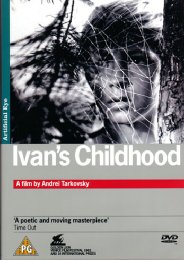
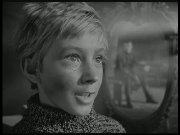
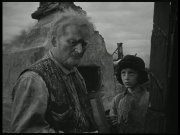
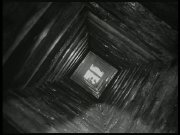
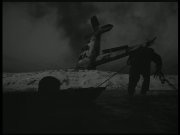
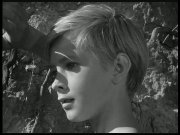
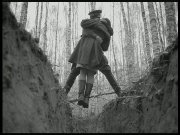
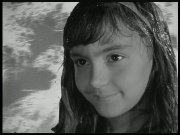
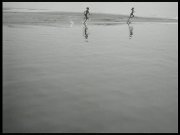
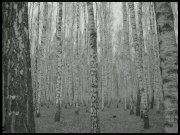








































Your Opinions and Comments
Be the first to post a comment!